

Back to School 2015-2016 - National Association for Music Education (NAfME)National Association for Music Education (NAfME) Even A Few Years Of Music Training Benefits The Brain. Music has a remarkable ability to affect and manipulate how we feel. Simply listening to songs we like stimulates the brain’s reward system , creating feelings of pleasure and comfort. But music goes beyond our hearts to our minds, shaping how we think. Scientific evidence suggests that even a little music training when we’re young can shape how brains develop, improving the ability to differentiate sounds and speech. With education funding constantly on the rocks and tough economic times tightening many parents’ budgets, students often end up with only a few years of music education.
Music has big brain benefits compared to other leisure pursuits. It turns out mom was right.
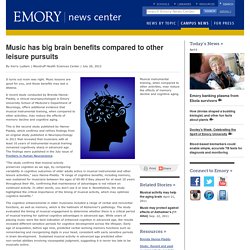
Music lessons are good for you, and those benefits may last a lifetime. A recent study conducted by Brenda Hanna-Pladdy, a clinical neuropsychologist in Emory University School of Medicine's Department of Neurology, offers additional evidence that musical instrumental training, when compared to other activities, may reduce the effects of memory decline and cognitive aging.
This is the second study published by Hanna-Pladdy, which confirms and refines findings from an original study published in Neuropsychology in 2011 that revealed that musicians with at least 10 years of instrumental musical training remained cognitively sharp in advanced age. The findings were published in the July issue of Frontiers in Human Neuroscience. The Importance of Music Education. The Benefits of Music Education . Music & Arts . Education. Whether your child is the next Beyonce or more likely to sing her solos in the shower, she is bound to benefit from some form of music education.

Research shows that learning the do-re-mis can help children excel in ways beyond the basic ABCs. More Than Just Music Research has found that learning music facilitates learning other subjects and enhances skills that children inevitably use in other areas. “A music-rich experience for children of singing, listening and moving is really bringing a very serious benefit to children as they progress into more formal learning,” says Mary Luehrisen, executive director of the National Association of Music Merchants (NAMM) Foundation, a not-for-profit association that promotes the benefits of making music.
Making music involves more than the voice or fingers playing an instrument; a child learning about music has to tap into multiple skill sets, often simultaneously. Why is Music Important? Did you know that music making is part of what makes humans human?
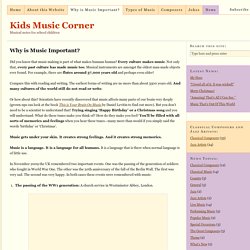
Every culture makes music. Not only that, every past culture has made music too. Musical instruments are amongst the oldest man-made objects ever found. For example, there are flutes around 37,000 years old and perhaps even older! Compare this with reading and writing. The Surprising Science Behind What Music Does To Our Brains.
I’m a big fan of music, and use it a lot when working, but I had no idea about how it really affects our brains and bodies.
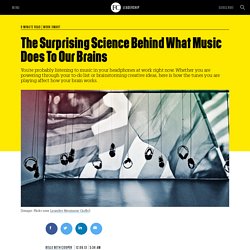
Since music is such a big part of our lives, I thought it would be interesting and useful to have a look at some of the ways we react to it without even realizing. "Without music, life would be a mistake" —Friedrich Nietzsche Of course, music affects many different areas of the brain, as you can see in the image below, so we’re only scratching the surface with this post, but let’s jump in. 1. The Importance of Music. The Importance of Music has been compiled by Ellen Judson* "Some people think music education is a privilege, but I think it's essential to being human.
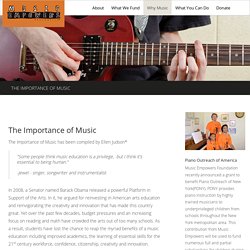
"-Jewel - singer, songwriter and instrumentalist In 2008, a Senator named Barack Obama released a powerful Platform in Support of the Arts. In it, he argued for reinvesting in American arts education and reinvigorating the creativity and innovation that has made this country great. Yet over the past few decades, budget pressures and an increasing focus on reading and math have crowded the arts out of too many schools. The Surprising Science Behind What Music Does To Our Brains. The Importance of Fine Arts Education. Education in the arts is an integral part of the development of each human being.
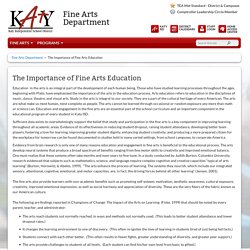
Those who have studied learning processes throughout the ages, beginning with Plato, have emphasized the importance of the arts in the education process. Arts education refers to education in the disciplines of music, dance, theatre, and visual arts. Study in the arts is integral to our society. They are a part of the cultural heritage of every American. The arts are what make us most human, most complete as people. Sufficient data exists to overwhelmingly support the belief that study and participation in the fine arts is a key component in improving learning throughout all academic areas. Science Proves Music Lessons Were the Best Thing Your Parents Ever Did for You. If your parents ever submitted you to regular music lessons as a kid, you probably got in a fight with them once or twice about it.
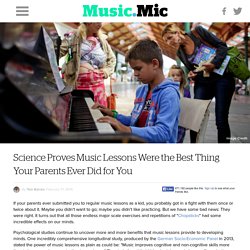
Maybe you didn't want to go; maybe you didn't like practicing. But we have some bad news: They were right. Music Makes Kids Smarter. Life Lessons I Learned in Marching Band. I recently returned from an enjoyable tour of Texas, during which I travelled to San Antonio, Waco, and Houston.
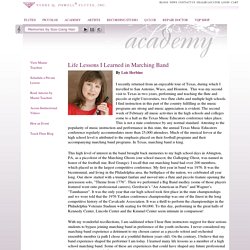
This was my second visit to Texas in two years, performing and teaching the flute and piccolo at eight Universities, two flute clubs and multiple high schools. Background on Music Education. Countless studies have touted the benefits of music education.
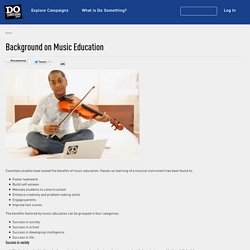
Hands-on learning of a musical instrument has been found to: Foster teamwork Build self-esteem Motivate students to come to school Enhance creativity and problem solving skills Engage parents Improve test scores. The Psychology of Music. 10 Reasons Kids Benefit from Music Instruction. 10 Reasons Kids Benefit from Music Instruction from the Elementary Classroom Teacher Resource Index 1) In a 1997 study of elementary students enrolled in an arts-based program, it was concluded that there was a definite correlation between students' rising math test scores and the length of time invested in arts education classes.

"Arts Exposure and Class Performance," Phi Delta Kappan, October, 1998. 2) A study published in 2000 revealed that music students possessing the ability to perform complex rhythms also are able to make faster and more accurate corrections in many academic and physical circumstances. Center for Timing, Coordination, and Motor Skills, 2000. STEM is incredibly valuable, but if we want the best innovators we must teach the arts. Math and science matter, but that’s not all. (Edmund D. Fountain for The Washington Post) We’ve all heard it before, we are facing another crisis. This time it’s one of mammoth proportions, and not the wooly kind. Public education isn’t making the cut as high-tech jobs across the nation go unfilled.
In 2011 the governor of my home state of Iowa, Terry Branstad, signed an executive order creating a STEM advisory council. “An increased focus in science, technology, engineering and math will lead to higher achievement and better career opportunities” Branstad said. President Obama has put a focus on STEM education with the White House’s Educate to Innovate initiative. STEM (science, technology, engineering and math) is believed to be the answer for our high tech job shortage.
“Making things faster, cheaper, better, bolder is what STEM does to many industries. Print Story Music speeds recovery from stroke study on Yaho. Music Advocacy for Administrators. Essential. Music Advocacy's Top Ten for Parents. Music Advocacy for Directors. Music Advocacy Top Ten. 20 Reasons why Music is important. Music lessons pay off in higher earnings poll Yahoo! News.
The Mind Altering Power of. Musicians Use Both Sides of Their Brains More Frequently Than Average People. Careers in Music. A-Shared-Endeavor.pdf. Arts Education: The Need for More Arts Teachers in School Arts in Education Week took place last month, and since then arts education has been on my mind and in the air. A recent blog post by Alan Yaffe - here -- that contended arts education advocacy should be focused more on art-making than art-viewing got me thinking. It is true, much energy goes into trying to get K-12 students to attend arts events, and that's wonderful and much-needed. We try to organize class trips, and bemoan the increasing challenges of getting access to buses, to getting the OK to leave school for an arts experience when the pressures of sticking to curriculum and "teaching to the test" are ever-present. Background on Music Education. Life Lessons I Learned in Marching Band. Standards – National Association for Music Education (NAfME)
The National Coalition for Core Arts Standards (NCCAS) is seeking educators interested in serving on a team that will benchmark student work generated by the 2015 Model Cornerstone Assessment Pilot Project. Applications, including a résumé or CV, (three page limit) highlighting experience in arts assessment will be accepted through Friday, April 24, 2015, at Members of the National Core Arts Standards or MCA writing team members are not eligible to apply. The Core Music Standards are all about Music Literacy. The standards emphasize conceptual understanding in areas that reflect the actual processes in which musicians engage. The standards cultivate a student’s ability to carry out the three Artistic Processes* of Creating,Performing, andResponding. These are the processes that musicians have followed for generations, even as they connect through music to their selves and their societies. NATIONAL CORE ARTS STANDARDS.